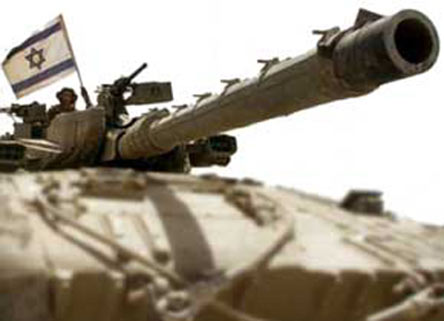
The Israeli leader, who arrived in Washington on Sunday, announced that he will return to Israel immediately after meeting with President Donald Trump at the White House on Monday morning.
"This was a criminal attack on the State of Israel, and we will respond with force," said Netanyahu, who is also the defense minister, in a short video clip from Washington. He said he had been briefed by the heads of Israeli security and that he would return to conduct Israel's response.
The military said it was reinforcing troops in the area with two additional brigades, one infantry and one armored and calling up "a limited number" of reservists for specialist units. It said Hamas, the Palestinian militant group that controls Gaza, was directly responsible for firing the rocket.
Images from the scene of the rocket strike showed the house was badly damaged, its roof caved in. Mika Lifshitz, a military spokeswoman, said that it was hit by a self-manufactured rocket with a range of around 75 miles. She said that Israel's antimissile protection system, the Iron Dome, protects the area, but could not comment on whether it was deployed.
Netanyahu, who is in the midst of a fierce battle for reelection with Israelis going to the polls in less than 15 days, was also scheduled to give a keynote address at the annual AIPAC policy forum conference on Tuesday morning and participate in a celebratory state dinner with Trump at the White House.
Netanyahu has been criticized in the past by members of his own government coalition for being too soft on Hamas.
In November, he agreed to a mediated cease-fire with the group after a spate of rocket attacks from Gaza toward communities in southern Israel. His political opponents have also criticized Netanyahu's decision to allow Qatar to deliver $15 million a month into Gaza to pay salaries of Hamas civil servants.
In Gaza, tensions have been high as residents of the impoverished strip, which has been under an Israeli sea and air blockade for more than a decade, have been protesting the extreme poverty and Hamas's heavy-handed tactics cracking down on unrest. Egypt has also sporadically imposed such restrictions, though has been opened the border crossing with Rafah more frequently over the past year.
This coming Saturday marks one year of weekly deadly protests by Gazans at the border fence with Israel. Dubbed the Great March of Return, the protests were initially intended to help win international recognition of the right of Palestinian refugees to return to their former homes, which sit within Israeli territory and ease restrictions on the Strip.
Hamas had used the march as a tool to ramp up pressure on Israel amid stalled cease-fire talks brokered by Egypt and the United Nations that would have allowed more investment in Gaza. In recent days it has sent flaming balloons into Israel, according to the Israeli military. The group had agreed to stop such actions under an interim deal that allowed the Qatari money into the enclave, which expires in weeks.
But domestic pressure has been building against Hamas, and analysts say the strain increases the need for the militants to deflect attention back toward Israel. In recent weeks protests against the dire living conditions in the Strip have been suppressed by the group, whose security forces have used batons and live ammunition to break up demonstrations.
Although rocket launches from Gaza are not unusual, Monday's rocket strike was the second time this month to target the major city of Tel Aviv. Israel and Hamas fought a 50-day conflict in the summer of 2014.
Of the seven Israelis injured in the house on an agricultural community, three were children and all were members of one family. Israeli media reported that their house will need to be destroyed because it is now no longer safe.
In the hours following the rocket strike, Israel announced that it was closing the main border crossings into the Gaza Strip, a rare move indicating a response will soon be coming.
Earlier this month, following reports of two rockets fired toward Tel Aviv from Gaza, the Israeli military responded by striking more than 100 targets in the coastal Palestinian enclave.
No injuries or damage to properties were reported on March 14 when the two rockets hit near Tel Aviv, but rocket sirens were activated sending thousands of Israelis in the most populous part of the country into bomb shelters.
In a follow-up assessment, the Israeli military said it believed Hamas was responsible, and Israeli media reported later that the army's initial assessment was that the group launched the rockets by mistake.
Local media reports said Monday's rocket was also fired by accident. No group has yet claimed responsibility for firing the rocket.
Every weekday JewishWorldReview.com publishes what many in the media and Washington consider "must-reading". Sign up for the daily JWR update. It's free. Just click here.
(COMMENT, BELOW)


 Contact The Editor
Contact The Editor
 Articles By This Author
Articles By This Author